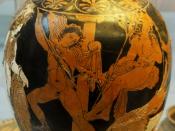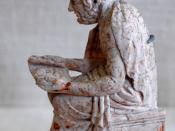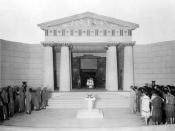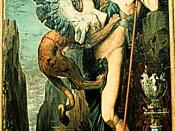Bernard Knox, in an excerpt from his novel, Oedipus at Thebes, celebrates Sophocles' most distinguished character, Oedipus, as a figure that exceeds literary boundaries, and becomes someone symbolic of an entire age. Not only does he represent one specific age, but his message transcends time as well, as a universal icon. According to Knox, Oedipus exemplifies human achievement, while at the same time realizing its fleeting existence. Subsequently, Knox explores a controversial issue concerning man's role with regard to the God's, as depicted by Sophocles. There is much truth to the generous criticism of Sophocles' character, Oedipus, as he truly is one of the defining figures in literature.
Sophocles truly captured "the essence of an age", as Knox put it, through his tragic hero, Oedipus. In Greece, during a time when the arts enjoyed one of their most affluent periods, Sophocles stood alone as the premier playwright, and the Oedipus trilogy was known by every Greek citizen who dared to call himself cultured.
Oedipus, was largely representative of Greek society in numerous facets. Oedipus' rise to King was a result of his wit and intelligence in defeating the Sphinx, just as Greece's rise as an extraordinary culture is centered around their precocious philosophies and an understanding of the world around them that was unlike any other from their era. Oedipus the King gives readers of future generations an insight into the Greek world through the eyes of Sophocles. The character, Creon is possesses the character traits that Sophocles believes a leader should maintain, including responsibility, rationale, objectivity and loyalty to the people over everything else. Sophocles' opinions coincide with the Greek idea for representative government, or a government by the people, for the people.
According to Knox, Oedipus is a rare example of a character that not only serves the people of his era, but also is a "creation that transcends time" and in my opinion, this could not be any more true. Oedipus is the quintessential tragic hero, and subsequent generations continue to model their characters after him. A perfect example would be Shakespeare's character, MacBeth. Both MacBeth and Oedipus are citizens of the first degree, with greater capabilities than the average individual, however the both suffer from a tragic flaw. The themes that Sophocles portrays are similarly timeless. Messages like, appearance versus reality and the concept of whether one can defy their fate, are questions that will be debated for centuries to come.
Although Oedipus has become a universal symbol, he still maintains human qualities. Oedipus earns his way to the throne after leaving his supposed family and saving Thebes from the dreaded Sphinx, but matter how successful he becomes, Sophocles reminds us that he not invincible and that magnificence cannot last forever. Towards the conclusion of the play, Oedipus says, "Ah! A nightmare mist has fallen/ Adamantine black for me-/ Abomination closing." His statement is a universal warning in support of Sophocles' point regarding the cost of brilliancy. Although Bernard Knox correctly points out that the fact that Oedipus can't sustain his excellence only makes his previous fortune seem even grander.
The final point addressed by Bernard Knox, in his criticism of Oedipus the King, deals with the ability of humans to produce pure heroism. One of the major themes throughout the play is Oedipus' attempt to overcome his fate and thus defeat the Gods, but he is unsuccessful at accomplishing such a feat. However, Oedipus is greater than the Gods in one sense; the fact that he is capable of momentary heroism, an achievement that even the Gods are incapable of, "for the condition of their existence is everlasting victory", as Knox puts it. By defeating the Sphinx, Oedipus saves the entire city of Thebes, thus making him a genuine hero of the people. At the outset of the play, the priest praises Oedipus to mythological proportions, saying, "So holy Sovereign, go. Raise up our city"æ. Your old devotion celebrates you still"æ. Be equal to your stature now. If king of men (as king you are), then be it of a kingdom manned and not desert." Oedipus is in his own category above men, until his murder of Laius becomes known and suddenly he is once again subservient to the Gods.
It is difficult to criticize a play that is considered a cornerstone for a society, not to mention an entire genre. Hence, Bernard Knox's remarks are not so much criticisms, as they are a tribute to a masterpiece. Knox makes several valid points concerning the formula to Sophocles' brilliance, all of which I am in complete agreement with. The irony to the story is that Sophocles created a character, in Oedipus, which has served as symbol for all of literature, and thus Oedipus is finally greater than the Gods.






